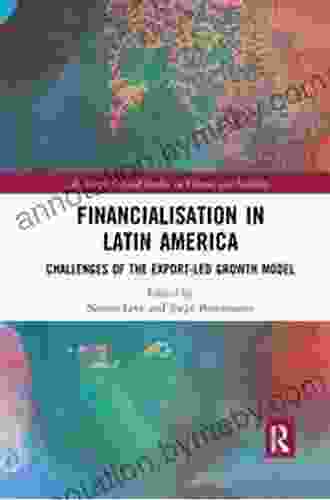Financialization In Latin America: Reshaping Economies, Societies, and Environments

Financialization, the increasing dominance of finance in the global economy, has emerged as a significant force shaping the economic, social, and environmental landscapes of Latin America. This book delves into the multifaceted impact of financialization in the region, offering a comprehensive analysis of its consequences for various aspects of life.
5 out of 5
| Language | : | English |
| File size | : | 5183 KB |
| Screen Reader | : | Supported |
| Print length | : | 288 pages |
Economic Transformation
Financialization has profoundly influenced Latin America's economies. It has led to:
- Increased Financial Market Activity: The region has witnessed a surge in financial markets, investment, and banking. This has facilitated access to capital for businesses and governments, but also raised concerns about volatility and risk.
- Growth of Financial Products: Financial institutions have introduced a wider range of financial products, such as mutual funds, bonds, and derivatives. While these products can provide diversification and investment opportunities, they also introduce complexity and potential risks.
- Financialization of Commodities: Latin America's dependence on commodities has been intertwined with financialization. Commodities are increasingly traded as financial assets, leading to price volatility and potential negative effects on local economies.
Social Impact
Financialization has had significant societal implications in Latin America. It has:
- Increased Financial Inclusion: Financialization has expanded access to financial services for previously underserved populations. However, it has also created new forms of financial exclusion and indebtedness.
- Widened Economic Inequality: Financial assets tend to be concentrated among the wealthy. Financialization has exacerbated income and wealth disparities, leading to social tensions and political unrest.
- Eroded Labor Standards: Financialization has contributed to the growth of the gig economy and precarious employment. It has also led to increased pressure on wages and benefits.
Environmental Sustainability
Financialization has had both direct and indirect impacts on Latin America's environment. It has:
- Financing of Extractive Industries: Financial institutions have played a major role in funding extractive industries, such as mining and oil extraction. These industries often have negative environmental consequences.
- Promotion of Carbon-Intensive Activities: Financial markets have tended to favor carbon-intensive investments. This has contributed to climate change and pollution.
- Limited Funding for Sustainable Development: Despite growing awareness of environmental sustainability, financial systems have not adequately prioritized investments in renewable energy and other sustainable practices.
Policy Implications
Understanding the impact of financialization in Latin America has important implications for policy. The book suggests:
- Regulating Financial Markets: Governments need to strengthen regulations to prevent excessive risk-taking and volatility in financial markets.
- Promoting Inclusive Financial Systems: Policies should aim to expand financial inclusion while addressing financial exclusion and indebtedness.
- Supporting Sustainable Development: Financial systems should be reoriented to prioritize investments in renewable energy and other sustainable practices.
- Addressing Social Inequality: Policies should seek to mitigate the negative social impacts of financialization, such as economic inequality and precarious employment.
Financialization has played a transformative role in Latin America, shaping its economies, societies, and environments. While it has brought certain benefits, it has also raised concerns about volatility, inequality, environmental degradation, and social exclusion. This book provides a critical analysis of financialization's impact, offering policymakers and stakeholders insights for navigating its challenges and harnessing its potential for sustainable and inclusive development.
5 out of 5
| Language | : | English |
| File size | : | 5183 KB |
| Screen Reader | : | Supported |
| Print length | : | 288 pages |
Do you want to contribute by writing guest posts on this blog?
Please contact us and send us a resume of previous articles that you have written.
 Book
Book Novel
Novel Page
Page Chapter
Chapter Text
Text Story
Story Genre
Genre Reader
Reader Library
Library Paperback
Paperback E-book
E-book Magazine
Magazine Newspaper
Newspaper Paragraph
Paragraph Sentence
Sentence Bookmark
Bookmark Shelf
Shelf Glossary
Glossary Bibliography
Bibliography Foreword
Foreword Preface
Preface Synopsis
Synopsis Annotation
Annotation Footnote
Footnote Manuscript
Manuscript Scroll
Scroll Codex
Codex Tome
Tome Bestseller
Bestseller Classics
Classics Library card
Library card Narrative
Narrative Biography
Biography Autobiography
Autobiography Memoir
Memoir Reference
Reference Encyclopedia
Encyclopedia Deray Mckesson
Deray Mckesson Nicolas Rothwell
Nicolas Rothwell Larry Mcmurtry
Larry Mcmurtry Deborah Tall
Deborah Tall Don Rowley
Don Rowley Declan Shalvey
Declan Shalvey Jacobus Kotze
Jacobus Kotze Diana Gabaldon
Diana Gabaldon Diane Capri
Diane Capri N L Mclaughlin
N L Mclaughlin Jon Lymon
Jon Lymon Debra Thurman
Debra Thurman Dom Amore
Dom Amore Edvard Munch
Edvard Munch Rick Stanton
Rick Stanton Sir David Tang
Sir David Tang Vishakha N Desai
Vishakha N Desai Donald Murray
Donald Murray Julia Quinn
Julia Quinn Scott Kirkpatrick
Scott Kirkpatrick
Light bulbAdvertise smarter! Our strategic ad space ensures maximum exposure. Reserve your spot today!

 Gabriel Garcia MarquezThe Story of the Earth in 25 Rocks: Unlocking the Earth's Ancient Secrets
Gabriel Garcia MarquezThe Story of the Earth in 25 Rocks: Unlocking the Earth's Ancient Secrets
 Orson Scott CardTales of a Long-Distance Swimmer: A Journey of Endurance, Determination, and...
Orson Scott CardTales of a Long-Distance Swimmer: A Journey of Endurance, Determination, and... Maurice ParkerFollow ·2.2k
Maurice ParkerFollow ·2.2k Preston SimmonsFollow ·15.1k
Preston SimmonsFollow ·15.1k Cormac McCarthyFollow ·10.6k
Cormac McCarthyFollow ·10.6k Carl WalkerFollow ·11.4k
Carl WalkerFollow ·11.4k Dwayne MitchellFollow ·16.6k
Dwayne MitchellFollow ·16.6k Matthew WardFollow ·14.4k
Matthew WardFollow ·14.4k Ernesto SabatoFollow ·19.6k
Ernesto SabatoFollow ·19.6k Eliot FosterFollow ·19.2k
Eliot FosterFollow ·19.2k

 Cruz Simmons
Cruz SimmonsGuide To Pencak Silat Kuntao And Traditional Weapons:...
Immerse yourself in the captivating world of...

 Dalton Foster
Dalton FosterUnlock Your Financial Freedom: Dive into the ABCs of Real...
Are you ready to embark on a...

 George Orwell
George OrwellThe Advanced Guide to Real Estate Investing: Your...
Are you ready to embark on...

 Will Ward
Will WardMargaret Laurence: The Making of a Writer
Margaret Laurence (1926-1987) was one of...

 Jorge Amado
Jorge AmadoThe ABCs of Property Management: A Comprehensive Guide...
Owning and managing rental...
5 out of 5
| Language | : | English |
| File size | : | 5183 KB |
| Screen Reader | : | Supported |
| Print length | : | 288 pages |










